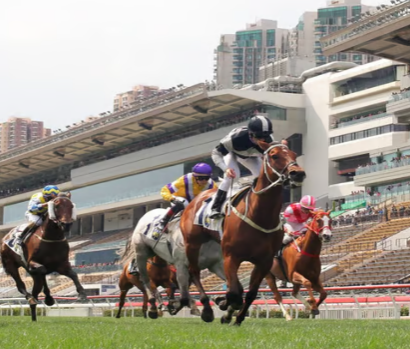In Hong Kong, horse racing is taxed between 72.5% to 75% due to its popularity and the exclusive rights of the Hong Kong Jockey Club. Other gambling activities, like the Mark Six Lottery, have varied rates.
Current Tax Rates
Hong Kong’s gambling tax rates have been structured to balance both the government’s revenue needs and the sustainability of the gaming industry. It’s noteworthy to mention that these rates are subject to periodic reviews by the government.

Breakdown of the Tax Rates for Different Types of Gambling
- Horse Racing: In Hong Kong, horse racing is a significant form of entertainment. The Hong Kong Jockey Club (HKJC) is the sole entity authorized to conduct horse racing events. A significant portion of the betting revenue goes to the government in the form of duties. As of the last update, the tax rate on horse race betting is approximately 72.5% of the gross profit.
- Mark Six Lottery: The Mark Six Lottery, a popular lottery system in Hong Kong, is also managed by the HKJC. The lottery has a slightly lower tax rate compared to horse racing, standing at 25% of its gross revenue.
- Football Betting: Football betting, another favorite pastime, faces a tax rate of around 50% on its gross profit.
- Other Forms of Gambling: While other forms of gambling are generally not authorized, any legal exceptions would have their respective tax rates specified by the government.
Comparing Hong Kong’s Rates with Other Major Cities
- Macau: Known as the “Las Vegas of Asia,” Macau has a thriving casino industry. While casinos are the mainstay, its tax rate is set at around 35% on gross revenue, which is lower than Hong Kong’s horse racing rate.
- Singapore: Singapore has integrated resorts like Marina Bay Sands and Resorts World Sentosa. The city-state imposes a tax rate that ranges from 5% to 15% based on the gross gaming revenue.
- London: In the UK, the tax rate varies based on the type of gambling activity. For example, the betting tax for land-based casinos stands at 20% of gross profit.
Mechanics of the Gambling Tax System
Understanding the workings of the gambling tax system in Hong Kong provides insights into the efficiency and transparency of its revenue generation. This system has been meticulously planned to ensure that funds collected benefit both the territory’s development and its citizens.
Collection Process
- Direct Submission by Operators: Organizations like the Hong Kong Jockey Club remit their tax obligations directly to the government. They calculate the tax due based on their gross profits and submit the funds typically on a quarterly basis.
- Electronic Monitoring: For some gambling activities, electronic systems track transactions in real-time. This ensures transparency and accuracy in tax collection, minimizing any discrepancies.
- Auditing: Regular audits are conducted to ensure that all operators comply with tax regulations. This ensures both accuracy and prevents any potential fraudulent activities.
- Penalties for Non-compliance: Any operator found not remitting the correct tax amounts faces hefty fines. Additionally, the government may revoke their license, which would prohibit them from operating in Hong Kong.

Allocation of Tax Revenues
- Infrastructure Development: A portion of the collected revenue gets channeled into infrastructure projects. This includes road development, public transport, and other civic projects to enhance the quality of life in Hong Kong.
- Social Welfare Programs: The government allocates a segment of these funds to social welfare initiatives. This includes healthcare, housing, and other essential services.
- Cultural and Recreational Initiatives: Funds also get used to promote arts, culture, and recreational activities. This not only enhances the quality of life but also helps to promote tourism, a vital part of Hong Kong’s economy.
- Reserves: Given the volatile nature of gambling revenues, a portion of these funds gets reserved. This ensures that in years where gambling profits might be lower, the government can still maintain its various initiatives without significant cuts.
Impact on Hong Kong’s Economy
Hong Kong’s gambling scene, though limited in its variety, plays a significant role in the local economy. The gambling tax system, with its substantial revenue contributions, has both direct and indirect implications on various sectors of the economy.
Contribution to Government Revenue
- Major Revenue Stream: Among the various streams of income the government draws from, gambling taxes stand out prominently. For instance, the Hong Kong Jockey Club, with its horse racing and lottery operations, consistently ranks among the top tax contributors.
- Stability in Revenue: While some industries might experience fluctuations due to external factors, gambling tends to remain resilient. This resilience provides the government with a consistent and reliable flow of funds.
- Infrastructure and Development Funding: A significant chunk of government projects, particularly infrastructure-related ones, derive financing from these gambling revenues. Roads, public transport systems, and other civic amenities see consistent development due to this stable funding.

Economic Implications for the Gaming Industry
- Boost to Local Employment: The gaming industry, especially horse racing, provides employment to thousands. From jockeys to event managers to support staff, many depend on this industry for their livelihoods.
- Tourism Magnet: Many tourists flock to Hong Kong to experience the renowned horse racing events. This influx not only boosts the gaming industry but also augments sectors like hospitality, food, and travel.
- Investment in Technology and Innovation: To maintain a competitive edge and enhance the gaming experience, companies continually invest in technology. This drive leads to collaborations with tech firms, fostering innovation and creating a tech-forward environment.
- Challenges and Competition: While gambling in Hong Kong, especially horse racing, is iconic, the industry faces stiff competition from nearby regions like Macau. This competition pushes the local industry to continuously reinvent and offer better experiences to patrons.
Regulations and Compliance
Hong Kong’s approach to gambling is a structured one, ensuring that while the industry thrives, it does so within a well-defined legal framework. This framework ensures fairness, integrity, and the safeguarding of societal interests, alongside generating revenue.
Licensing and Monitoring of Gambling Operations
- Selective Licensing: In Hong Kong, licenses for gambling activities are granted sparingly. For example, the Hong Kong Jockey Club remains the sole operator for horse racing and lottery systems.
- Frequent Reviews: Licensed entities undergo regular reviews to ensure they adhere to all regulations. This involves rigorous checks on their operations, financial transactions, and the technology they employ.
- Technological Surveillance: With advancements in technology, authorities use electronic systems to monitor betting activities. This ensures transparent and fair operations, reducing the chances of fraudulent activities.
- Collaborations with International Bodies: To uphold global standards, Hong Kong authorities often collaborate with international regulatory bodies. This partnership ensures that Hong Kong’s gambling operations remain at par with global best practices.

Penalties for Tax Evasion and Non-compliance
- Hefty Fines: Operators found guilty of tax evasion face severe financial penalties. These fines often far exceed the evaded tax amount, acting as a deterrent to other operators.
- License Revocations: Beyond fines, non-compliant entities risk having their licenses revoked. Such a measure would cripple their operations in Hong Kong.
- Legal Prosecutions: In extreme cases of non-compliance, company executives might face legal prosecutions. This can lead to jail terms, further emphasizing the seriousness with which authorities view compliance.
- Public Disclosures: To maintain transparency and alert the public, authorities often disclose details of non-compliant operators. Such disclosures can harm the reputation of operators, making it challenging for them to regain trust.
Public Perception and Social Impact
The topic of gambling, while profitable for Hong Kong, carries with it a spectrum of public opinions. The territory’s approach to managing its gambling industry is not just about revenue generation but also centers on the socio-cultural implications of these activities.
The Public’s View on Gambling and its Taxation
- Cultural Acceptance: Historically, gambling has found cultural acceptance in many East Asian societies, and Hong Kong is no exception. Activities like horse racing have become more than just betting events – they are social gatherings and are deeply rooted in the local culture.
- Awareness of Tax Benefits: Many residents understand that the high tax rates on gambling contribute significantly to government revenues. This money gets funneled back into the community through infrastructure and welfare programs, a fact that the public widely acknowledges and appreciates.
- Concerns Over Addiction: While many enjoy gambling as a form of entertainment, there’s a growing awareness and concern about addiction. Some segments of society advocate for more restrictive measures or greater awareness campaigns to address this issue.
Measures to Combat Problem Gambling
- Awareness Campaigns: The government, in collaboration with various NGOs, regularly launches campaigns highlighting the dangers of gambling addiction. These initiatives aim to educate the public, offering information on recognizing the signs of addiction and where to seek help.
- Counseling and Support: Several centers provide counseling services to those facing gambling addiction. They offer a safe space for individuals to discuss their problems and seek therapeutic interventions.
- Self-exclusion Programs: For those who recognize their own vulnerabilities to gambling, there are self-exclusion programs. These initiatives allow individuals to voluntarily bar themselves from participating in gambling activities for a set period.
- Collaborations with Gambling Operators: Authorities collaborate closely with operators like the Hong Kong Jockey Club to ensure they take proactive steps in identifying and assisting problem gamblers.

